US raising alarm over 'deteriorating' humanitarian crisis in Ethiopia's war-torn Tigray region
In an exclusive interview, USAID's team leader urges better humanitarian access.
The Biden administration is voicing increasing concern about the reported atrocities committed in Ethiopia's Tigray region and continued restrictions and challenges for aid organizations responding to a crisis that has only grown since fighting erupted last November.
The U.S. deployed a disaster response team to the region last month, but its leader told ABC News in an exclusive interview that its personnel and aid partners still need greater and sustained access to civilians in the region, warning of a growing humanitarian crisis without international aid.
"Humanitarians absolutely need unhindered access to populations in need, and we are concerned about the fact that there are populations that we haven't yet been able to reach," said Emily Dakin, the senior U.S. Agency for International Development official leading the U.S. response in Tigray.
That response, totaling $305 million to date, is providing emergency food aid, medical care, temporary shelters and "extremely important" support for victims of violence, especially sexual-based violence, according to Dakin. Just days ago, President Joe Biden's U.N. ambassador Linda Thomas-Greenfield warned of fresh "reports of rape and other unspeakably cruel sexual violence," adding that the overall situation was "deteriorating."
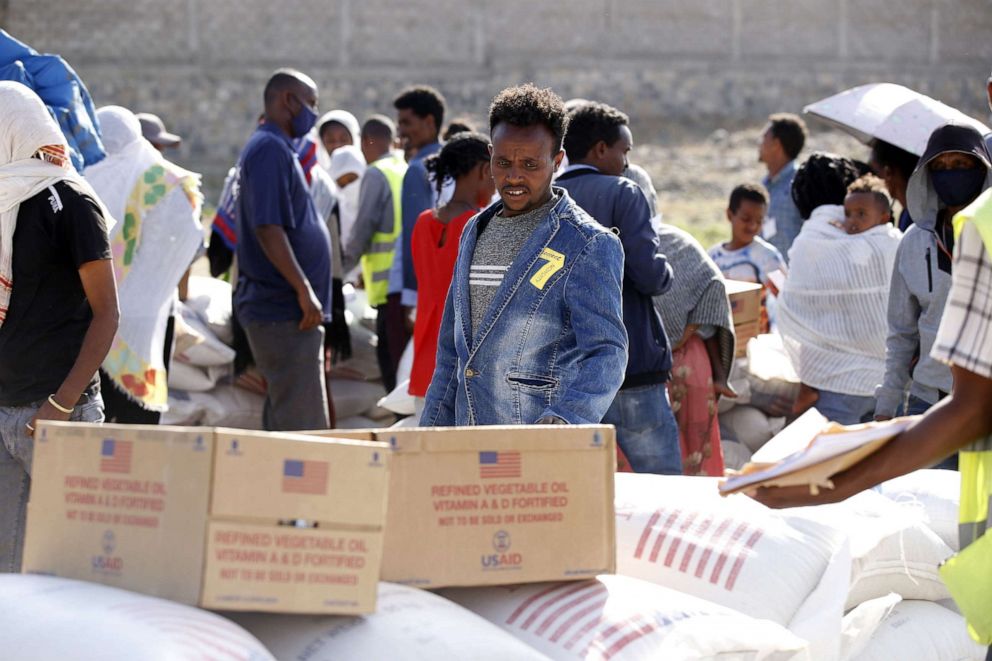
The federal government of Ethiopia, Africa's second most-populous country and a linchpin of security, has been battling Tigray's regional ruling party, the Tigray People's Liberation Front. Amid tensions over local elections, Prime Minister Abiy Ahmed accused the TPLF of attacking government bases last fall -- launching an offensive as long-simmering tensions hit a boiling point. Eritrea, a small neighboring country long at odds with the TPLF too, sent troops across the border and have been accused of some of the worst atrocities.
After almost six months of fighting, the conflict has displaced nearly 2 million people, according to the United Nations -- with tens of thousands of refugees fleeing into neighboring Sudan. It's unclear how many people have been killed, but it is estimated that thousands of people are dead.
While Abiy's government has said that it secured victory against the TPLF and fighting has ended, clashes continue, according to aid groups and media outlets on the ground.
Members of the U.S. Disaster Assistance Response Team, or DART, have not directly experienced conflict, but ongoing fighting "makes it challenging to ensure that we're able to support our partners to have the safe and consistent access they need to really be able to respond to some of the pretty dire humanitarian needs that we're seeing, particularly around food assistance," Dakin told ABC News.
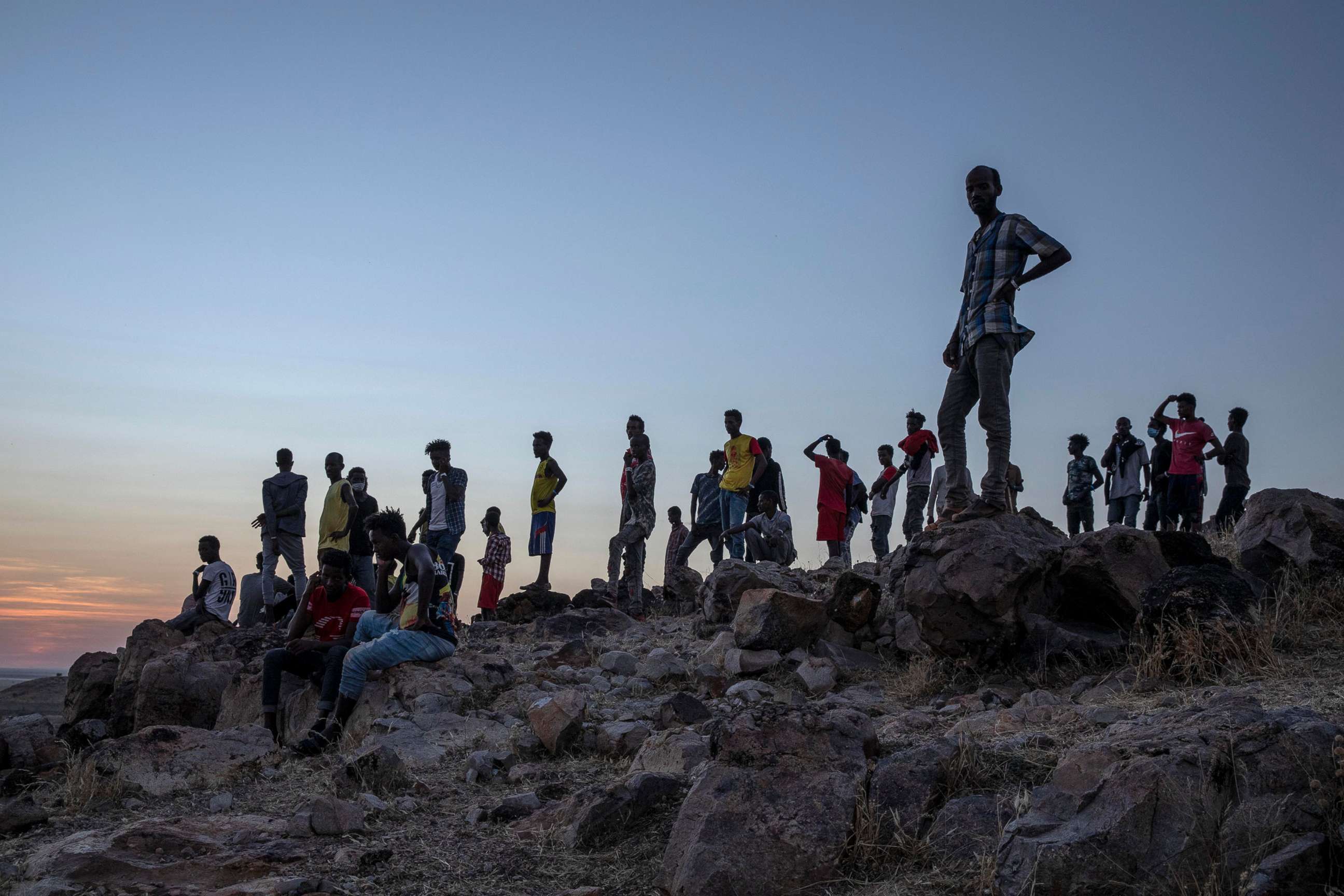
Just weeks ago, a Doctors Without Borders team arrived at the aftermath of an ambush attack on Ethiopian government forces, then witnessed those troops pull four men off a bus and kill them. Government forces later beat the Doctors Without Borders team's driver, according to the aid group.
The Biden administration has called for a ceasefire and demanded that Eritrean troops leave the country -- which Abiy announced on March 26 they agreed to do. But last week, Thomas-Greenfield warned there were "credible reports that Eritrean forces are re-uniforming as Ethiopian military in order to remain in Tigray indefinitely," and there is no evidence other Eritrean troops have departed.
Secretary of State Antony Blinken has described atrocities in the region as "ethnic cleansing," urging Abiy and all the parties to halt hostilities. But the State Department has declined to blame different fighting forces for certain atrocities, even as Amnesty International, Human Rights Watch and several media outlets have published reports documenting specific crimes by Eritrean troops, Ethiopian troops and the TPLF.
Instead, Thomas-Greenfield is warning that the "humanitarian and human rights situation" is "deteriorating," including more reports of sexual violence.
More 500 rape cases have been reported, the United Nations said in late March, although the number is likely higher. The top health official in Tigray's interim government told Reuters last week, "Women are being kept in sexual slavery."
"We are horrified by the reports of rape and other unspeakably cruel sexual violence that continue to surface. The degradation and trauma associated with these attacks will have long-term effects on the affected communities. We condemn all sexual violence and demand perpetrators be brought to justice," Thomas-Greenfield in a statement Thursday, hours after the U.N.'s aid chief briefed the Security Council in a closed-door session.
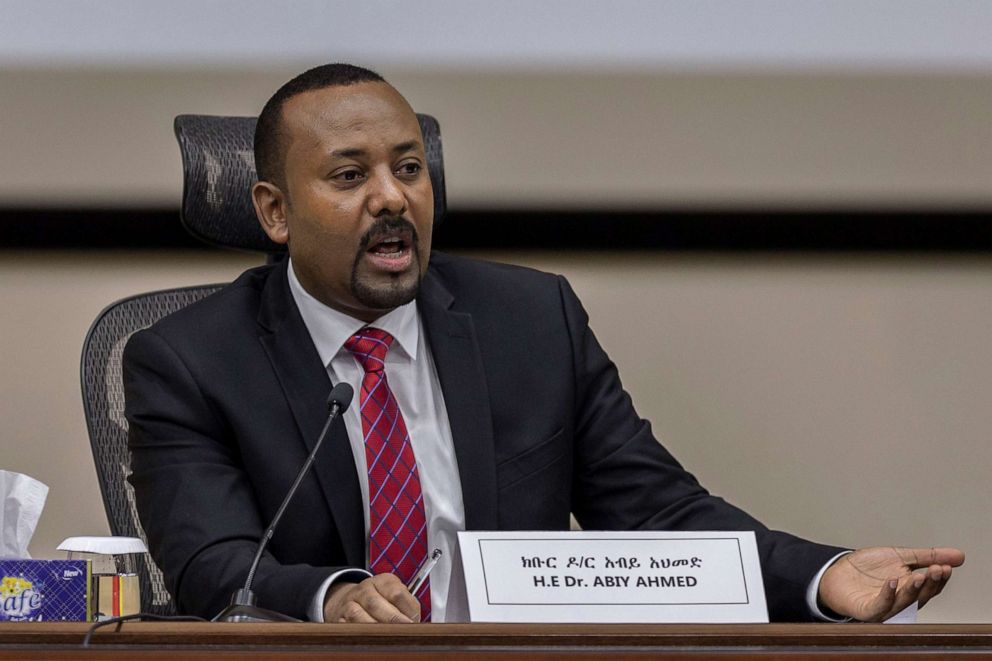
Dakin told ABC News in an interview last week that USAID is "seeing a significant number of needs" for sexual violence counseling and medical care, while declining to "speak to the absolute scale."
"We have worked to scale up the medical attention, the case management and we've supported specialized training for health care staff to care for survivors of violence," she added.
The growing level of hunger, however, is what alarms many humanitarians. There are 4.5 million people in need of immediate assistance, including 4 million who need immediate food aid, Dakin said, and approximately 400,000 women and children suffering from malnutrition.
"We are very concerned about rising malnutrition levels and the U.N. has warned about the risk of famine," she said, warning the situation could "deteriorate if our partners are not able to safely and consistently access the populations in need."
Fighting has not only destroyed crops, but also interrupted last fall's harvest, forcing folks to flee their farms and livestock and impeding market access -- all of which has exacerbated the current crisis.
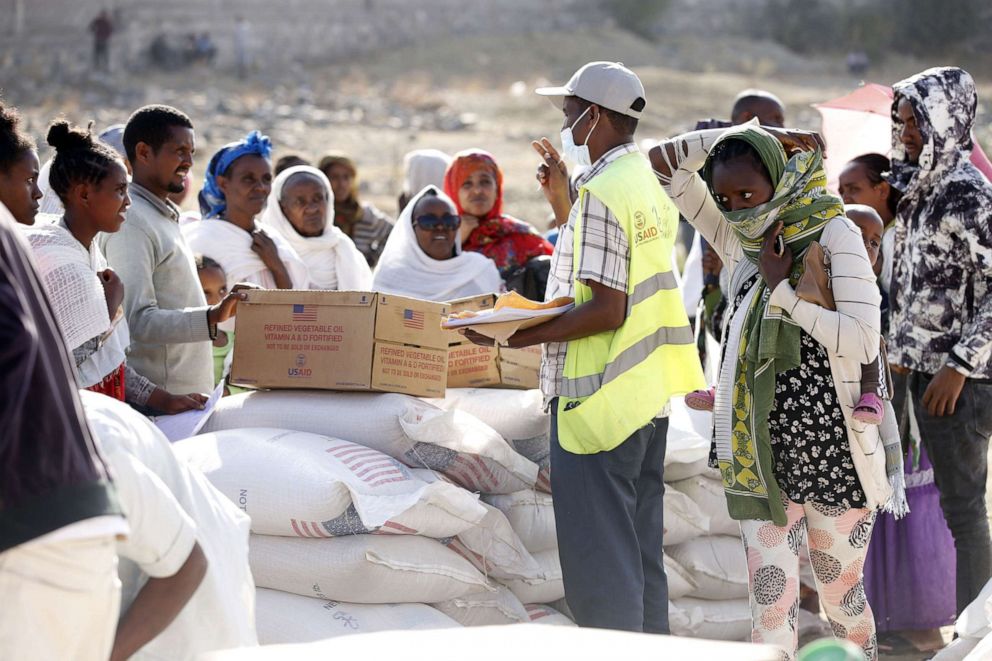
Compounding the challenge is that much of Tigray's health care system has been destroyed, according to Dakin, who declined to say whether facilities were intentionally targeted.
"We've been very concerned about lack of functionality of health centers in Tigray. Approximately 37% of health centers are currently functional and the health system is really on the verge of collapse," she said, noting the U.S. is funding about 30 mobile health care and nutrition teams that are operating throughout the region.
While Ethiopian government forces have been responsible for some of that destruction, Dakin called Abiy's government a "key partner in this response." The U.S. team and other aid groups are still dependent on the government's permission to bring in certain equipment, although Dakin said there have been "some marked improvements" since Abiy approved "a blanket-notification process" in March that allows humanitarian workers to travel to the region and "really scale up in a way that's required."
But the fighting itself continues to make aid work very difficult. While humanitarian convoys have not been targeted, the unpredictability of violent clashes and the blocking of key highways, for example, have made their work at times impossible, according to aid groups.
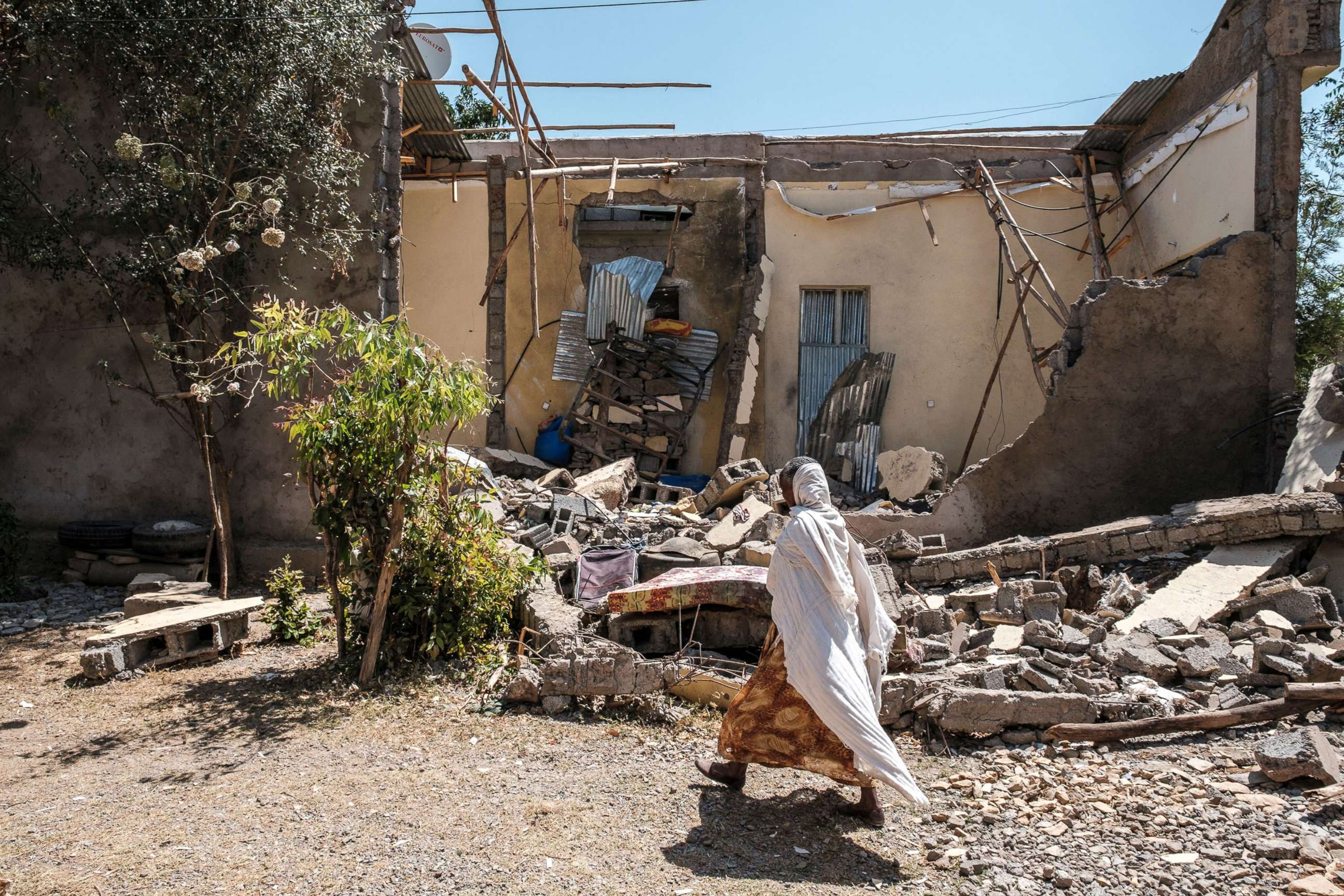
Dakin declined to address questions about the government's response, saying diplomatically, "We're focused more really on the humanitarian impact and how we can make sure that our partners are really able and resourced to meet the needs of the population."
But there is growing urgency elsewhere in Washington for Abiy to change course. The top Republican on the Senate Foreign Relations Committee, Sen. Jim Risch of Idaho, said last week that Abiy "must fulfill his commitments on Tigray regarding the full withdrawal of Eritrean troops, full humanitarian access and accountability for human rights abuses."
His Democratic colleague, Sen. Chris Coons of Delaware, who Biden sent as an emissary to meet Abiy last month, carried the same message, tweeting, "I'm disappointed PM Abiy has not yet fulfilled his commitments to withdraw Eritrean forces, remove obstacles to humanitarian access, & hold perpetrators of human rights abuses accountable. I'm concerned by atrocities continuing to occur across #Ethiopia—inside & outside of Tigray."
In the meantime, U.S. aid will continue -- and continue to push for greater access -- Dakin said: "We are seeing such significant humanitarian needs that we will continue to provide assistance and support to partners ... in a needs-based way."




